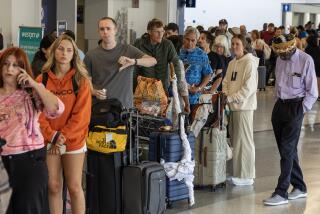Ordeal in Iraq Has O.C. Man ‘Still Shaking’
For nearly four months, his primary enemies were tedium, uncertainty and a lingering anxiety. Half a world from his Westminster home, Gene Lovas was a hostage in Iraq, trapped front row and center as nations marshaled their forces for war.
A 45-year-old construction superintendent for Bechtel Corp., Lovas had hunkered since mid-August in the safe haven of the U.S. Embassy in Baghdad. He slept on the floor of a storeroom. He played cards or dominoes to pass the time, made new friends and monitored the daily news reports.
But on Monday, it was finally time to come home to Orange County. After some queasy moments with Iraqi authorities over his exit papers, a harrowing jet flight to Germany and two days of stress and travel, Lovas finally made it.
As the sun was setting, he stepped from a stretch limousine dispatched by his employer and gazed up at the yellow “Welcome Home!!!” sign draped below a basketball hoop on his cozy, blue-trimmed house in the heart of suburbia.
A small grin arched just below his mustache. Welcome home, indeed.
“I’m still shaking,” Lovas said, grasping a glass of champagne in one hand and displaying his other, which trembled slightly. “It’s been a very, very tough 48 hours. . . . Right up until the last minute I worried that this thing might somehow fall right apart.”
Lovas was among the latest wave of hostages who returned home this week to the United States, released by Iraqi President Saddam Hussein in a goodwill gesture as a United Nations-imposed Jan. 15 deadline nears for Iraq to pull back its forces from Kuwait.
Before retiring to his home with family and friends, Lovas paused on the freshly mowed lawn to reflect on ahis months in Iraq and savor the sights and smells of his neighborhood. A next-door neighbor brought by a gold-wrapped package bearing a red rose. His father-in-law arrived to ask with studied nonchalance, “So, how was it?” before smiling and seizing Lovas in a bear hug.
“As Andy Warhol said, I’ve got my 15 minutes of celebrity,” Lovas cracked with a smile, noting how he was besieged at the airport by television crews hungry for news from the front. “And I’m on overtime now.”
Like so many others, the burly construction foreman blamed his captivity on a bad dose of luck--of being in the wrong place at the wrong time.
Lovas left his family in Westminster and sold his construction company in Anaheim last year to take the job in Iraq. He had just returned to Baghdad from a vacation when Hussein’s troops stormed into Kuwait on Aug. 2, ushering in the crisis.
For more than two weeks, it was pretty much business as usual for Lovas and his colleagues. But on Aug. 18 they were tipped off by U.S. officials to seek asylum at the embassy. Lovas left his hotel room with only the clothes on his back and took a taxi to the embassy. It would be his home for the next four months.
Lovas and others who flooded the embassy did not face the moment-to-moment drama of American hostages hiding in occupied Kuwait or the daunting fears of those held as “human shields” by the Iraqis. But they had their own demons to conquer. They dealt with the daily strain of uncertainty and doubt. They hoped for the best and prepared for the worst.
“It was just very confining. It was incarceration 24 hours a day,” Lovas said of his stay at the embassy. “Although we were comfortable, we never knew what was coming. We didn’t know if the bombers would be coming in over the horizon or if it was going to be peace.”
They listened to the news reports, trying to decipher fact from fiction. There was news of peace groups, of former boxing heavyweight champ Muhammad Ali coming to ask that the hostages be released. Word even circulated that aging motorcycle stuntman Evel Knievel planned to jump a half-dozen tanks. Lovas almost expected to hear that Ringling Bros. and Barnum & Bailey circus was going to show up.
Lovas was among about 40 people who crowded into the ambassador’s house, sleeping on floors, in hallways or sprawling on the lawn. For the first three or four days, Lovas bedded down on the cold floor. Eventually he got a mattress.
Strangers, thrust under the same roof by world events, quickly became friends.
“The boredom got to be quite bad, and the unknown, never knowing what tomorrow would bring,” he said.
He watched over the weeks and months as other hostages were allowed to leave. Though he was never on the plane back home, Lovas didn’t give up hope. As if to signal his optimism, Lovas never unpacked his bags, which were fetched from his hotel room by embassy employees. “I switched off between two pairs of pants and two shirts the entire four months,” he said.
In many ways the outside world was so very close, but so far. Lovas and the others at the embassy could make telephone calls, and he spent 10 minutes each week on the phone with his wife, Holly, and 8-year-old son, Jeffrey.
Lovas also took care of most of the shopping for those at the compound, journeying into the markets of Baghdad. He stayed purposely low key, never letting on that he was an American. “I didn’t go out with a cowboy hat and cowboy boots on certainly,” he noted.
He found the Iraqi people to be completely accommodating, never challenging.
“They’re primarily in disbelief over what is going on,” Lovas said. “They felt very bad about the situation.”
Finally, news arrived last week that all the hostages would be allowed to return home. It was just the beginning of what would be a draining ordeal for Lovas and the rest.
Along with about 375 other hostages waiting to board an Iraqi Airlines 747, Lovas spent 10 agonizing hours waiting to have his departure papers processed by officials in Baghdad. Lovas said his passport was among seven that were withheld by Iraqi officials for special scrutiny.
“They were playing their head games,” he said. “It was tough. We had those doubts.”
But they were allowed to leave. Their flight to Frankfurt, Germany, was relatively uneventful--until landing. As the Iraqi pilot approached the airstrip, the plane suddenly stalled and plummeted toward earth. The pilot threw on the throttle about 50 feet above the ground to make another go around at the runway, Lovas said.
More to Read
Sign up for Essential California
The most important California stories and recommendations in your inbox every morning.
You may occasionally receive promotional content from the Los Angeles Times.






